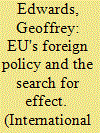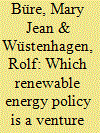|
|
|
Sort Order |
|
|
|
Items / Page
|
|
|
|
|
|
|
| Srl | Item |
| 1 |
ID:
078494


|
|
|
|
|
| Publication |
2007.
|
| Summary/Abstract |
This paper presents a perspective on the application of theoretical and empirical methods to the study of domestic and transnational terrorism. The use of such methods can lead to informed policy making. On the theoretical side, both choice-theoretic and game-theoretic methods are examined. For empirical applications, the paper focuses on the study of trend, cycles, and forecasting. Additionally, the use of intervention analysis in various forms is reviewed with to regards to evaluating policy effectiveness and quantifying the economic impact of terrorism. Although this paper is not intended as a literature review, some key studies are highlighted for readers to pursue in greater depth
|
|
|
|
|
|
|
|
|
|
|
|
|
|
|
|
| 2 |
ID:
125792


|
|
|
|
|
| Publication |
2013.
|
| Summary/Abstract |
Using the Poisson pseudo-maximum likelihood estimation technique, this paper evaluates the effects of renewable electricity policies on renewable electricity generation using a large panel dataset that covers 122 countries over the period of 1980-2010. The results suggest that renewable electricity policies play a crucial role in promoting renewable electricity generation, but their effectiveness is subject to diminishing returns as the number of policies increases. There is also evidence that the effects of renewable electricity policies are more pronounced before 1996 as well as in developed and emerging market countries, and the negative policy interaction effect fades with the stage of economic development. Lastly, policy effectiveness varies by the type of renewable electricity policy and energy source. Only investment incentives and feed-in tariffs are found to be effective in promoting the development of all types of renewable energy sources for electricity considered in this paper.
|
|
|
|
|
|
|
|
|
|
|
|
|
|
|
|
| 3 |
ID:
186949


|
|
|
|
|
| Summary/Abstract |
In many developing countries, low population density may be a major reason for low school participation in rural areas, and the problem is likely to worsen with rapid urbanization. However, few studies have investigated empirically the role of population density in rural education, especially the moderating effect of population density on the outcomes of education policies. This study aims to fill this gap in the literature. From 1999 through the early 2000s, China launched a set of major nationwide policies aimed at universalizing 9-year compulsory education in rural areas. Using difference-in-differences and triple difference strategies, we show that the policies significantly increased the probability of junior high school enrollment of rural children and, more importantly, these policies were more effective in densely populated regions. These findings confirm the importance of population density to rural education.
|
|
|
|
|
|
|
|
|
|
|
|
|
|
|
|
| 4 |
ID:
127018


|
|
|
|
|
| Publication |
2013.
|
| Summary/Abstract |
The Lisbon Treaty sought to meet new global challenges by providing the European Union (EU) with stronger institutional capacity and policy instruments to make it a more effective international actor in foreign and security terms. The article sets out the structures and practices agreed and contested by both Member States - especially the United Kingdom and France - and the European Commission, focusing on the roles of the High Representative (HR) for Foreign Affairs and the European External Action Service. It points to the disjuncture between the formal calls for greater coherence and consequence in the EU's foreign policies, the problems of creating an effective policy vehicle and the practices that undermine both its efforts and its legitimacy.
|
|
|
|
|
|
|
|
|
|
|
|
|
|
|
|
| 5 |
ID:
186438


|
|
|
|
|
| Summary/Abstract |
The electrification of the car fleet is an essential transformation to a meaningful reduction of greenhouse gas emissions in road transport. This has been a major goal of European transport policies, but other actions can also enhance the effectiveness of EVs to reduce emissions. In this paper we analyse four key European and German transport policies and assess how these could be improved to increase their potential to reduce emissions. Using iterative feedback from 12 interviews across various stakeholder groups, we have developed proposals for revised policies on electric vehicles. The results show that current policies in the EU and Germany are not making use of the full environmental potential of EVs, because they do not differentiate sufficiently between different EVs, and have been designed for the era of combustion vehicles. We suggest that the introduction of a new Bonus-Malus Registration Scheme and the overhaul of the existing Road Tax System are the most promising changes both in terms of their potential to reduce emissions and their likelihood of adoption.
|
|
|
|
|
|
|
|
|
|
|
|
|
|
|
|
| 6 |
ID:
117256


|
|
|
|
|
| Publication |
2013.
|
| Summary/Abstract |
Carbon capture and storage (CCS) has the potential to play a major role in the stabilization of anthropogenic greenhouse gases. To develop the capture technology from its current demonstration phase towards commercial maturity, significant funding is directed to CCS, such as the EU's €4.5 bn NER300 fund. However, we know little about how this funding relates to market diffusion of CCS. This paper addresses that question. We initially review past learning effects from both capacity installations and R&D efforts for a similar technology using the concept of two-factor learning. We apply the obtained learning-by-doing and learning-by-searching rates to CCS in the electricity market model Hector, which simulates 19 European countries hourly until 2040, to understand the impact of learning and associated policies on CCS market diffusion. We evaluate the effectiveness of policies addressing learning-by-doing and learning-by-searching by relating the policy budget to the realized CCS capacity and find that, at lower policy cost, both methods are about equally effective. At higher spending levels, policies promoting learning-by-doing are more effective. Overall, policy effectiveness increases in low CO2 price scenarios, but the CO2 price still remains the key prerequisite for the economic competitiveness, even with major policy support.
|
|
|
|
|
|
|
|
|
|
|
|
|
|
|
|
| 7 |
ID:
104881


|
|
|
|
|
| Publication |
2011.
|
| Summary/Abstract |
Over the past decade, state policies on renewable energy have been on the rise in the U.S., providing states with various options for encouraging the generation of renewable electricity. Two promising policies, the Renewable Portfolio Standard (RPS) and the Mandatory Green Power Option (MGPO), have been implemented in many states but the evidence about their effectiveness is mixed. In this paper, we argue that recognizing the natural, social, and policy context under which MGPO and RPS are adopted is necessary in order to measure their true effectiveness. This is because the context rather than the policy might lead to positive outcomes and there is the possibility for sample bias. When controlling for the context in which the policies are implemented, we find that RPS has a negative impact on investments in renewable capacity. However, we find that investor-owned utilities seem to respond more positively to RPS mandates than publicly owned utilities. By contrast, MGPO appears to have a significant effect on installed renewable capacity for all utilities regardless of the context in which it is implemented.
|
|
|
|
|
|
|
|
|
|
|
|
|
|
|
|
| 8 |
ID:
092725


|
|
|
|
|
| Publication |
2009.
|
| Summary/Abstract |
Governments around the world have adopted ambitious targets to increase the share of renewable energy and reduce greenhouse gas emissions. They pursue a variety of policy approaches to achieve these targets. It has been a popular theme for contributions in Energy Policy to investigate the effectiveness of such policies. This article adds a new perspective to the debate, namely looking at the policy preferences of private investors in innovative clean energy technology firms. We surveyed 60 investment professionals from European and North American venture capital and private equity funds and asked them to assess the effectiveness of various policies, in terms of stimulating their interest to invest in innovative clean energy technologies. In addition to quantitative rankings, we use qualitative interview data to capture additional information on why investors prefer some policies over others. The combined analysis compensates for the inherent limitations of a quantitative ranking using generic policy types. The results of this exploratory analysis demonstrate that, all other things being equal, investors in our sample perceived feed-in tariffs to be the most effective renewable energy policy. The overall preference for feed-in tariffs is even more pronounced among investors based in Europe and with higher exposure to clean energy.
|
|
|
|
|
|
|
|
|
|
|
|
|
|
|
|
|
|
|
|
|